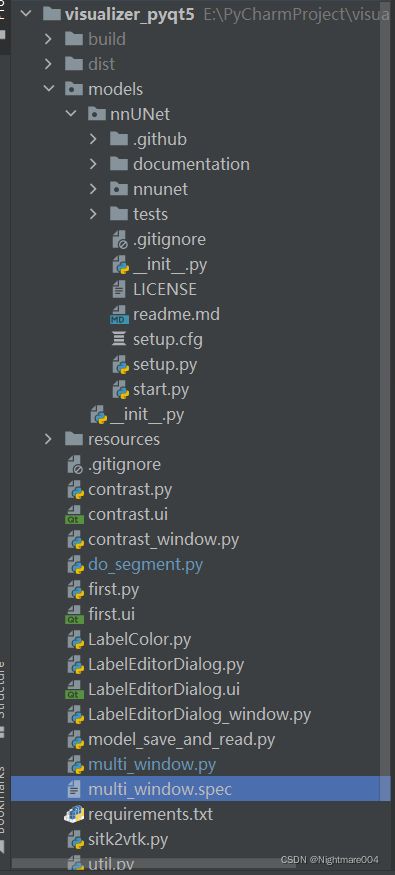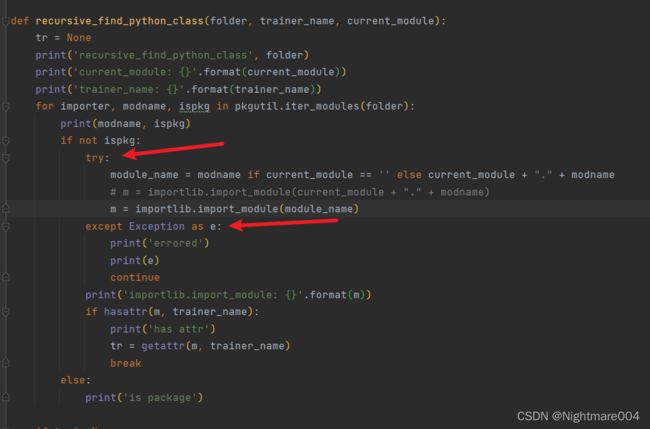打包报错记录2
上一集
前置知识
sys.path是一个包含了python搜索路径的列表,如果这个列表都找不到这个模块,就g了
项目结构
项目结构大概是这样的(忽略build和dist)
启动项在multi_window.py
中间的nnUNet链接https://github.com/MIC-DKFZ/nnUNet
nnUnet没动过,所以他的import并不是从项目名字(visualizer_pyqt5)开始的
do_segment调用了nnUnet的方法(所以使得打包变得复杂了起来)

这里引用包,采用一种神奇的方法
打包后,路径有发生变化,所以不能用sys.path.append(’…’)这种方法
#!/usr/bin/env python
# _*_ coding:utf-8 _*_
import os
import sys
if getattr(sys, 'frozen', None):
base_dir = sys._MEIPASS
else:
base_dir = os.path.dirname(os.path.realpath(__file__))
sys.path.append(os.path.join(base_dir, 'models', 'nnUNet'))
第一次打包
初代spec文件
# -*- mode: python -*-
# _*_ coding:utf-8 _*_
import os
import sys
block_cipher = None
# 当前路径
cur_path=os.path.abspath('.')
# python所在的路径
python_path=sys.path[4]
# 第三方包路径
packages_path=os.path.join(python_path,'Lib','site-packages')
block_cipher = None
# 需要的数据
datas=[
(os.path.join('resources','*'),'resources')
]
for model in models:
if os.path.isabs(model):
model = os.path.abspath(model)
model = os.path.relpath(model, cur_path)
for root, dirs, files in os.walk(model):
for file in files:
datas.append((os.path.join(root, file), root))
a = Analysis(['multi_window.py'],
pathex=[
],
binaries=[],
datas=datas,
hiddenimports=[],
hookspath=[],
hooksconfig={},
runtime_hooks=[],
excludes=[],
win_no_prefer_redirects=False,
win_private_assemblies=False,
cipher=block_cipher,
noarchive=False)
pyz = PYZ(a.pure, a.zipped_data,
cipher=block_cipher)
exe = EXE(pyz,
a.scripts,
[],
exclude_binaries=True,
name='multi_window',
debug=False,
bootloader_ignore_signals=False,
strip=False,
upx=True,
console=True,
disable_windowed_traceback=False,
target_arch=None,
codesign_identity=None,
entitlements_file=None )
coll = COLLECT(exe,
a.binaries,
a.zipfiles,
a.datas,
strip=False,
upx=True,
upx_exclude=[],
name='multi_window')
难受啊,他搜不到可还行

经过https://pyinstaller.readthedocs.io/en/stable/usage.html
这个-p可以添加搜索路径

第二次打包
这里与上一个的区别是:pathex加了那个找不到的nnUnet的路径
# -*- mode: python -*-
# _*_ coding:utf-8 _*_
import os
import sys
block_cipher = None
# 当前路径
cur_path=os.path.abspath('.')
# python所在的路径
python_path=sys.path[4]
# 第三方包路径
packages_path=os.path.join(python_path,'Lib','site-packages')
block_cipher = None
# 需要的数据
datas=[
(os.path.join('resources','*'),'resources')
]
for model in models:
if os.path.isabs(model):
model = os.path.abspath(model)
model = os.path.relpath(model, cur_path)
for root, dirs, files in os.walk(model):
for file in files:
datas.append((os.path.join(root, file), root))
a = Analysis(['multi_window.py'],
pathex=[
os.path.join(cur_path, 'models', 'nnUNet')
],
binaries=[],
datas=datas,
hiddenimports=[],
hookspath=[],
hooksconfig={},
runtime_hooks=[],
excludes=[],
win_no_prefer_redirects=False,
win_private_assemblies=False,
cipher=block_cipher,
noarchive=False)
pyz = PYZ(a.pure, a.zipped_data,
cipher=block_cipher)
exe = EXE(pyz,
a.scripts,
[],
exclude_binaries=True,
name='multi_window',
debug=False,
bootloader_ignore_signals=False,
strip=False,
upx=True,
console=True,
disable_windowed_traceback=False,
target_arch=None,
codesign_identity=None,
entitlements_file=None )
coll = COLLECT(exe,
a.binaries,
a.zipfiles,
a.datas,
strip=False,
upx=True,
upx_exclude=[],
name='multi_window')
提示没有sklearn.utils._typedefs,这个简单啊

第三次打包
设置
hiddenimports=[‘sklearn.utils._typedefs’]
# -*- mode: python -*-
# _*_ coding:utf-8 _*_
import os
import sys
block_cipher = None
# 当前路径
cur_path=os.path.abspath('.')
# python所在的路径
python_path=sys.path[4]
# 第三方包路径
packages_path=os.path.join(python_path,'Lib','site-packages')
block_cipher = None
# 需要的数据
datas=[
(os.path.join('resources','*'),'resources')
]
for model in models:
if os.path.isabs(model):
model = os.path.abspath(model)
model = os.path.relpath(model, cur_path)
for root, dirs, files in os.walk(model):
for file in files:
datas.append((os.path.join(root, file), root))
a = Analysis(['multi_window.py'],
pathex=[
os.path.join(cur_path, 'models', 'nnUNet')
],
binaries=[],
datas=datas,
hiddenimports=['sklearn.utils._typedefs'],
hookspath=[],
hooksconfig={},
runtime_hooks=[],
excludes=[],
win_no_prefer_redirects=False,
win_private_assemblies=False,
cipher=block_cipher,
noarchive=False)
pyz = PYZ(a.pure, a.zipped_data,
cipher=block_cipher)
exe = EXE(pyz,
a.scripts,
[],
exclude_binaries=True,
name='multi_window',
debug=False,
bootloader_ignore_signals=False,
strip=False,
upx=True,
console=True,
disable_windowed_traceback=False,
target_arch=None,
codesign_identity=None,
entitlements_file=None )
coll = COLLECT(exe,
a.binaries,
a.zipfiles,
a.datas,
strip=False,
upx=True,
upx_exclude=[],
name='multi_window')
啊这

这nnunet真是= =
这个nnunet.path[0]其实有点问题,可能搜索不到

这个recursive_find_python_class非常的神奇
会莫名其妙找一些不存在的包,然后import,然后报错,还不try except
所以我的做法
加try except

搜索路径修改为绝对路径,原本的路径毛都搜不到
base_dir的定义和上面的一样

保险起见,我在init.py里
从from . import *改成了from . import xxx因为不知道为啥,有时候搜索不到一些包
第四次打包
注意os.walk(‘models/nnUNet/nnunet’)
为了能让他顺利搜索,我把py文件全部拷过去了
# -*- mode: python -*-
# _*_ coding:utf-8 _*_
import os
import sys
from PyInstaller.utils.hooks import collect_submodules
block_cipher = None
# 当前路径
cur_path=os.path.abspath('.')
# python所在的路径
python_path=sys.path[4]
# 第三方包路径
packages_path=os.path.join(python_path,'Lib','site-packages')
block_cipher = None
models=[
'models/nnUNet/nnUNetTrainerV2__nnUNetPlansv2.1'
]
# 需要的数据
datas=[
(os.path.join('resources','*'),'resources')
]
hidden_imports = ['sklearn.utils._typedefs']
for model in models:
if os.path.isabs(model):
model = os.path.abspath(model)
model = os.path.relpath(model, cur_path)
for root, dirs, files in os.walk(model):
for file in files:
datas.append((os.path.join(root, file), root))
for root, dirs, files in os.walk('models/nnUNet/nnunet'):
for file in files:
if file.endswith('.py') and not file.startswith('__'):
datas.append((os.path.join(root, file), root))
a = Analysis(['multi_window.py'],
pathex=[
os.path.join(cur_path, 'models', 'nnUNet')
],
binaries=[],
datas=datas,
hiddenimports=hidden_imports,
hookspath=['models/nnUNet/nnunet/training/network_training'],
hooksconfig={},
runtime_hooks=[],
excludes=[],
win_no_prefer_redirects=False,
win_private_assemblies=False,
cipher=block_cipher,
noarchive=False)
pyz = PYZ(a.pure, a.zipped_data,
cipher=block_cipher)
exe = EXE(pyz,
a.scripts,
[],
exclude_binaries=True,
name='multi_window',
debug=False,
bootloader_ignore_signals=False,
strip=False,
upx=True,
console=True,
disable_windowed_traceback=False,
target_arch=None,
codesign_identity=None,
entitlements_file=None )
coll = COLLECT(exe,
a.binaries,
a.zipfiles,
a.datas,
strip=False,
upx=True,
upx_exclude=[],
name='multi_window')
启动
礼貌Nightamre:你妈

参考这里
https://github.com/pyinstaller/pyinstaller/wiki/Recipe-Multiprocessing
if __name__=='__main__':
# 在此处添加
multiprocessing.freeze_support()
# 这里是你的代码
# ......
